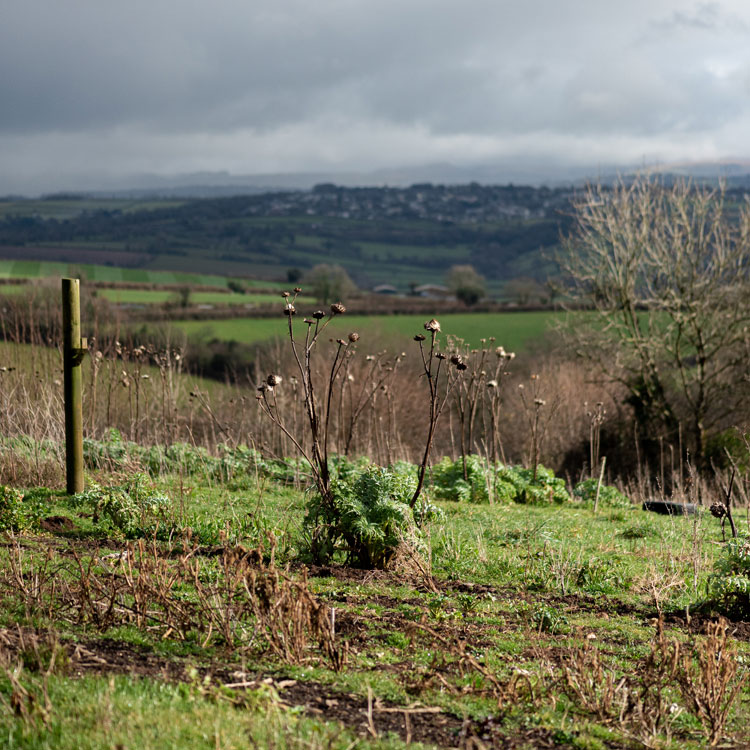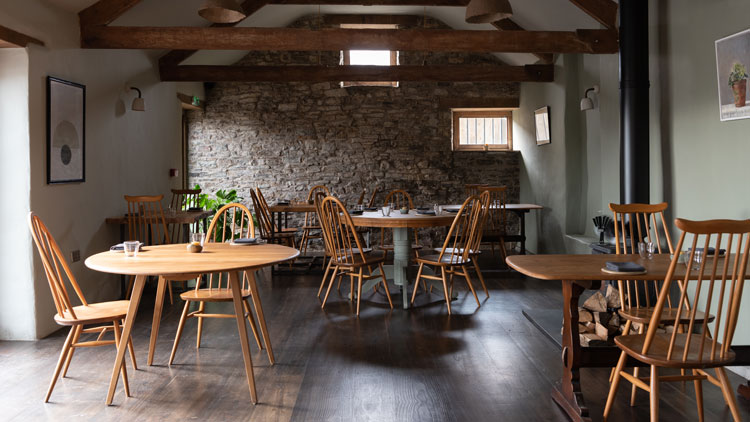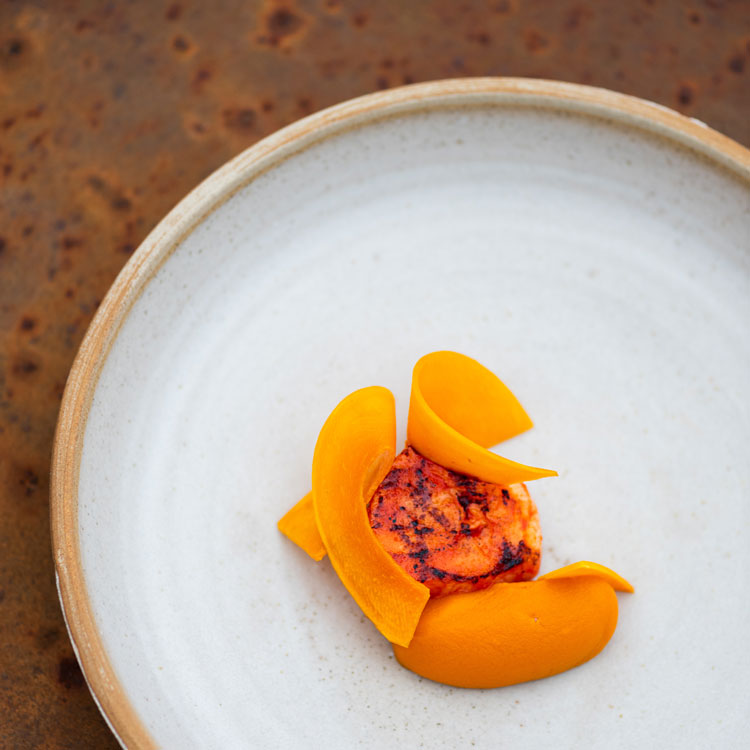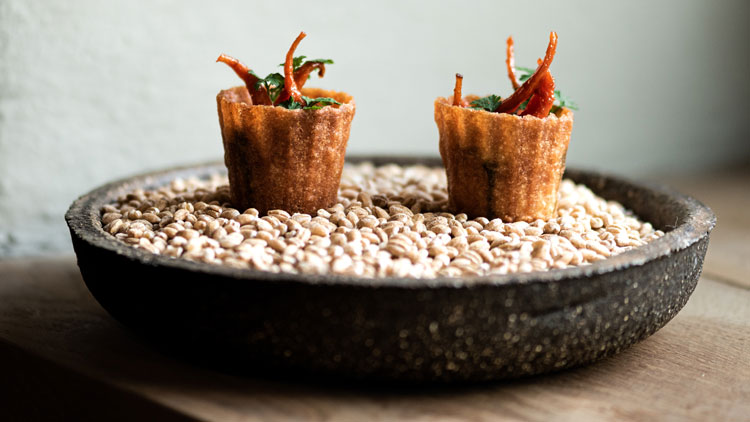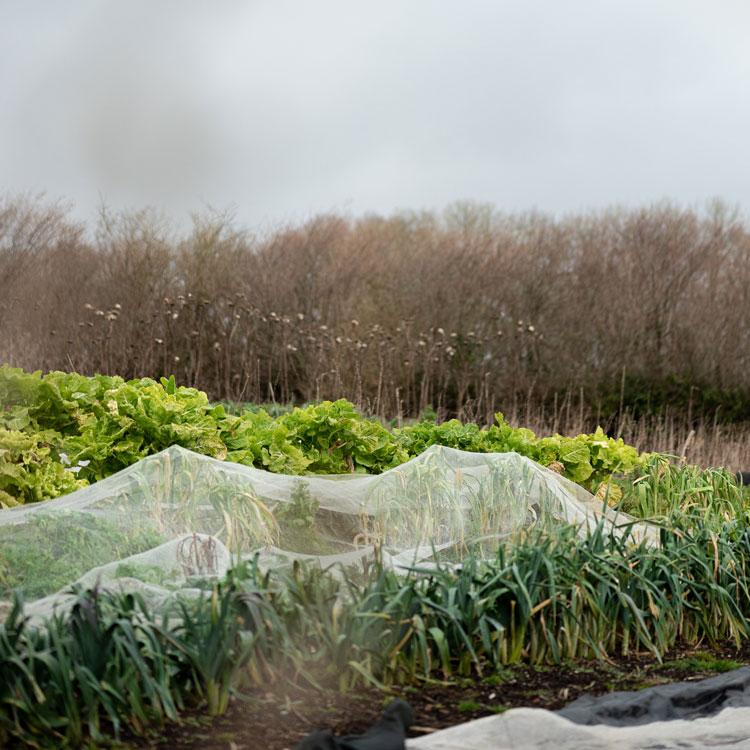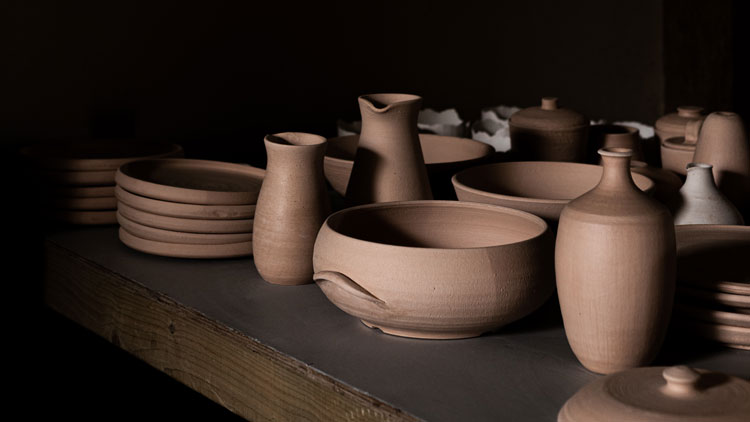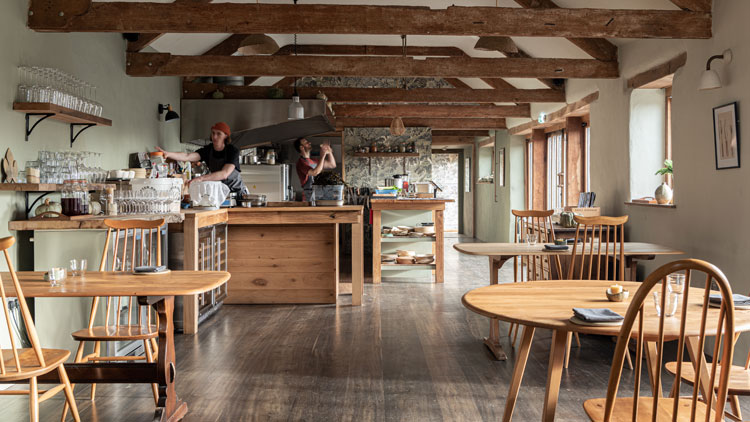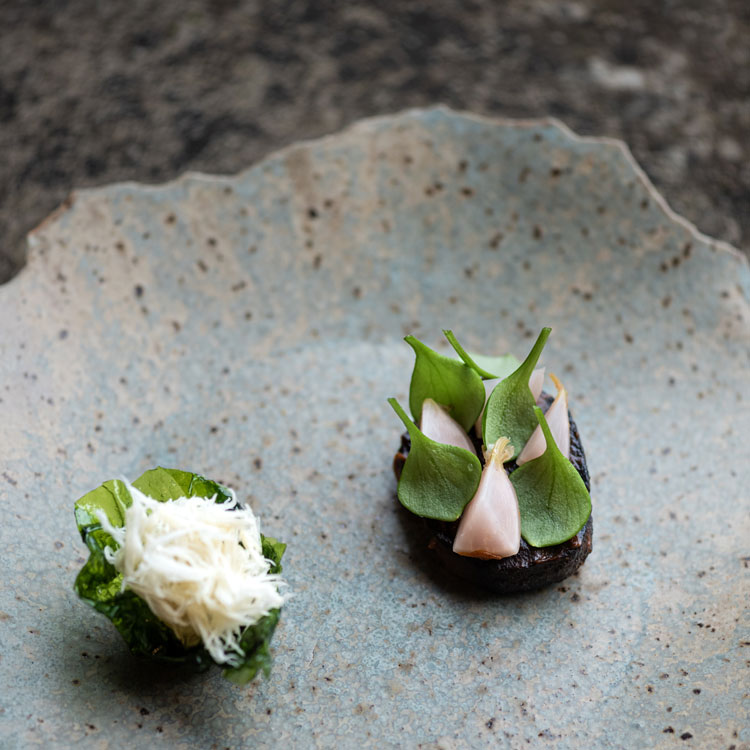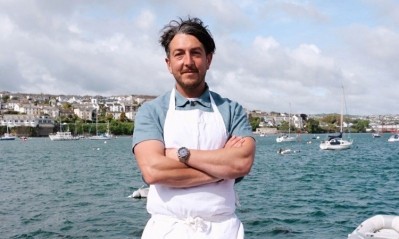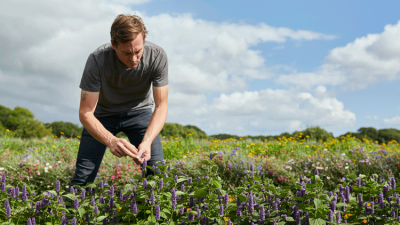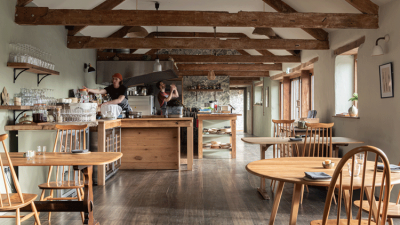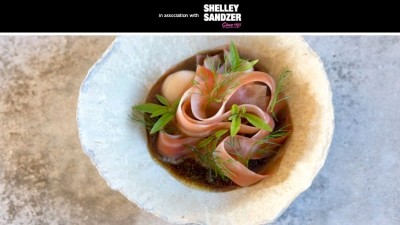Betting the farm: Dan Cox on Crocadon
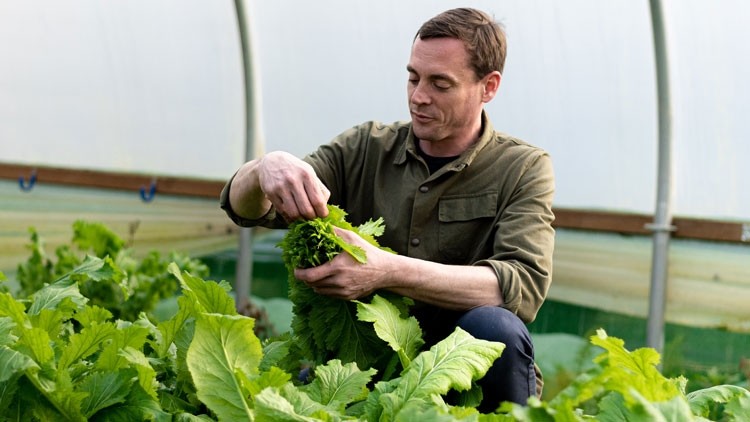
Dan Cox digs his hand into the earth and pulls out a clump of soil. “This is the most important thing on the farm and the starting point for much of what we do,” he says, letting it fall through his fingers.
We’re on one of the many fields that make up his 120-acre Crocadon Farm near Saltash in Cornwall. It’s a ruggedly beautiful spot. Cox’s own flock of sheep are grazing in a neighbouring field unbothered by the cold wind that whips up the Tamar Valley from the sea to south. Dartmoor is in the distance to the east and the farm is surrounded by rolling hills and a scattering of rural villages including St Mellion and Bere Alston.
But at this moment Cox is more interested in what is directly under his feet. We stop to observe a collection of mole hills. The small mammals are usually the bane of a farmer’s existence, yet Cox is thrilled by their presence. “They’re a sign that the ecosystem within the soil is healthy. It means there are lots of worms, which is also great. Our job here is to understand what the soil needs. Food is only as good as the soil it is grown in.”
The ex-Simon Rogan chef believes that 99% of Britain’s agriculture system is broken and wants to prove that a regenerative approach that puts the soil first not only makes for incredible produce but can deliver a healthy bottom line too.
Making the numbers add up is a work in progress, but the main elements of the business are now up and running with Cox having opened his restaurant – also called Crocadon – earlier this year.
Making hay while the sun shines
March is a strange time to visit a restaurant that grows its own. Polytunnels aside, little is coming out of the ground aside from a few of the hardier brassicas. As such Cox and his small team are largely reliant on produce preserved during more bountiful times.
“Preserving is not a fad for us. If we didn’t do it there would not be anything on the menu"
To this end, a walk-in fridge is packed with all manner of pickles, vinegars, misos, kojis and garums as well as some unprocessed veg – including parsnips, kohlrabi and some gnarly looking carrots - that have simply been cleaned up and stacked in such a way to allow air to circulate.
“Preserving is not a fad for us. If we didn’t do it there would not be anything on the menu. I do my shopping at the supermarket like everybody else. It’s odd to walk round Waitrose and see all sorts of different produce available – you think, ‘where on earth is that coming from?’” says Cox as he shows me around his surprisingly large network of converted farm buildings.
Cox has his fair share of challenges at the farm, but a lack of space is not one of them. The tasting menu-focused restaurant is part of a large horseshoe-shaped stone building that’s arranged around a courtyard with an outdoor cooking setup that is used for more casual pop-ups.
There are numerous other buildings dotted around in various states of repair including a huge barn and - a few minutes’ walk away from the restaurant - a beautiful but creaking six-bedroom farmhouse that Cox has made his home.
Growing pains
With the creation of Crocadon, Cox has taken a ‘farm first’ approach that hasn’t made things easy. He had initially planned to launch a restaurant at Crocadon a few years after taking it on in 2017 but didn’t quite appreciate the amount of time and capital it would take to get the farm running as he wanted it to. Abiding by the principles of regenerative agriculture – which includes focusing on topsoil regeneration, avoiding pesticides, recycling farm waste, promoting biodiversity and building in climate change resilience - might be good for the planet but it’s a labour-intensive way of going about things.
"I underestimated how much work it would be. Taking on a farm is very different to taking on a restaurant," he says. "I came here knowing how to grow but farming on this scale is not easy. In the first year there were areas of the farm that I didn't even go to. I literally had no money when I came here. It was quite foolish, really.”
Cox kept his head above water by growing regenerative produce for high-end vegetable supplier Natoora. From the sound of it, he didn’t much enjoy it and growing at the scale required for a large company left little time for anything else. Both cash and time poor, he was stuck in a rut, until a year ago a local landowner rode to the rescue and provided the capital for him to open the restaurant side of the business.
A Heath Robinson approach
The injection of cash has taken the pressure off the farm and given Cox the time to finish off various building projects. Yet the chef is still working on a shoestring budget given the scale of the project. There are probably toilets in Mayfair restaurants that cost more than Crocadon did overall.
Given that both farming and the upper end of the restaurant business are famously unprofitable endeavors, Cox’s frugality is sensible and also chimes with Crocadon’s sustainable ethos. He has undertaken nearly all the renovations on the farm himself – he taught himself the necessary trades, including plumbing, general building and rudimentary electrics from watching YouTube videos – and has sourced most of his restaurant and farming kit second hand.
Bodged together from parts purchased over the internet, Cox’s battered meat-aging fridge is a good example of his thrifty Heath Robinson approach. “It’s got a few intricacies,” he smiles as he opens the fridge door to reveal the large cuts of sheep and venison the kitchen is currently working its way through. A euphemism for things not performing quite as they should, this word is applied to a number of things at Crocadon including – but not limited to – the antiquated plumbing system in the farmhouse and Cox’s Border Collie Flash.
Growing up in the Big Smoke
With his well-worn work boots and mud-splattered jeans, it’s difficult to imagine Cox living anything other than the good life. But he grew up in inner city London – in the shadow of Arsenal football stadium, to be precise - and spent much of his career in the Big Smoke. Trained at Westminster Kingsway, the young Cox cut his teeth in top London restaurants including Mayfair’s The Greenhouse before moving over to corporate fine dining.
Encouraged by his then mentor Roger Naylor, it was in the kitchens of major financial institutions including Merrill Lynch that he prepared for The Roux Scholarship, winning it in 2008 on his third try. Becoming a Roux Scholar boosted Cox’s profile, but it also put him on the path that has led him to Crocadon.
“When you win The Roux Scholarship you can go pretty much wherever you want,” he says. “I’d been trying to do a stage at El Bulli for years, so I said that’s where I wanted to go. But Michel and Albert warned me off.”
The late great brothers thought the Catalonia-based restaurant was faddy and were also concerned he’d be lost in a corner among many other stagiaries. They instead suggested the nearby Can Fabes, another now closed three-star an hour’s drive from El Bulli.
At the time, its late chef Santi Santamaria was publicly berating Ferran Adrià for being more interested in gelling agents and stabilisers than local culinary traditions and high-quality seasonal produce. “He was doing lots of interviews while I was there having just published a book calling Adrià out (La Cocina al Desnudo). He accused him of turning fine dining into McDonald’s by putting all this bullshit in his food. I agree with him.”
Working under the famously cantankerous chef had its moments – it didn’t help that Cox had learned Castilian Spanish in preparation for his placement rather than the kitchen’s mandated language Catalan – but the then 26-year-old thrived in this unfamiliar, challenging environment. Can Fabes also opened his eyes to how good raw ingredients could be.
“We’d go to the market every morning and buy fish straight off the boats. It would still be in rigor mortis when we got it back to the restaurant. Things in London have now improved a bit, but at that point everything came from Billingsgate. The fruit and vegetables were incredible too.”
Running with Rogan
Soon after returning to the UK Cox started working for Simon Rogan having met him and his then head chef at L’Enclume Mark Birchall through The Roux Scholarship. “After Can Fabes [Simon] was the only chef back home who I wanted to work with because he was so interested in produce and growing.”
Cox was largely focused on development across Rogan's Umbel Restaurant Group playing a key role to help him set up the inaugural Aulis in Cartmel, Simon Rogan at The French in Manchester and, latterly, launch Fera at Claridge’s as executive chef, which won a star within three months of opening.
He also oversaw the launch of Our Farm, the organic Cumbria farm that supplies Rogan’s UK operations. “When I started working for the group Simon was getting his veg grown to his specification at a small organic farm down the road from L’Enclume but they closed. We thought it would be quite simple to set up, but it wasn’t.”
Scaling up
While his experience at Our Farm has been invaluable, Crocadon is a different beast. At 120 acres, it’s 10 times bigger and produces a much wider variety of produce.
The garden that grows the vegetables, fruit and herbs for the restaurant is just three acres. The rest of the farm is made up of 50 acres of arable land, 30 acres of permanent pasture, a couple of orchards producing apples, pears, walnuts and cherries and some unusable areas including an old quarry and some woodland. Cox also sublets 20 acres to organic ingredients company Good Earth Growers.
While it might sound like he has bitten off more than he can chew at Crocadon, it was never the plan to run it by himself. To realise his vision of a largely self-sufficient operation that puts nature first he has partnered with several like-minded artisans, in some cases letting them space for separate businesses that have a symbiotic relationship with his own operations.
Now under the auspices of James Rylance, Crocadon’s brewery is a good example of this approach. With a CV that includes key roles at influential craft brewers Kernel and Beavertown, he is one of the UK’s most in-demand brewers. Hidden away behind a sliding door close to Crocadon’s dining room, Ideal Day brewery uses regeneratively-farmed grain to make a wide range of beers.
“The main reason we built the brewery was that it was nearly impossible to find beer that fitted with our ethos,” Cox says. “There are some amazing craft brewers out there, but they all use conventionally-farmed grain and import hops from all over the world.”
In order to focus on establishing a restaurant, Cox has given over control of the bulk of Crocadon’s farming operation to husband-and-wife duo Tim Williams and Claire Hannington-Williams, who have considerable experience managing regenerative farms and permaculture-based growing systems.
“There are some amazing craft brewers out there, but they all use conventionally-farmed grain and import hops from all over the world"
Williams is looking after the arable side of things with Hannington-Williams now running Crocadon’s garden as a separate business that will sell produce back to the restaurant. In addition to this, the pair will soon launch a café in the same building that houses the restaurant.
Mamm will be run as a separate business but will serve bakery items – including bread, cakes and viennoserie - made by Cox and team within a recently completed onsite bakery that is being led by Zac Poulot, the former executive pastry chef of Mayfair restaurant Hide.
Progressive flock
Williams was originally set to look after Crocadon’s 50-strong flock of sheep but - with a number of other farming projects on the go in the South West – now doesn’t have time. That responsibility has fallen to Cox, his kitchen team and Flash. It’s been a bit of a learning curve for all concerned - Cox’s decision not to castrate his lambs resulted in some unexpected pregnancies and a larger flock than he had bargained for – but the results speak for themselves.
Beautifully marbled, clean tasting and served with a thick layer of snowy white fat and crisp skin, Crocadon’s mutton is a revelation. “I’ve been working with sheep meat my whole career. So long in fact that I remember the Mutton Renaissance (the campaign launched in 2004 that sought to re-establish mutton’s quality credentials and get it back on restaurant menus). Chefs using meat from older animals is a good thing, but a lot of the mutton served today isn’t that great.”
At Crocadon, Cox has wound the clock back to a time when sheep were farmed for their wool rather than their meat and therefore slaughtered much later in life. “Most mutton you get these days is slaughtered when the ewes stop lambing, which is usually between three and five years. What I would call true mutton is five years plus. Another big issue is that most sheep are kept inside over winter and fed grain. Our sheep aren’t molly-coddled, they’re kept outside all year long and are pure pasture. This means they put on a lot of subcutaneous fat and develop good intermuscular fat (marbling).”
"Chefs using meat from older animals is a good thing, but a lot of the mutton served today isn’t that great"
Crocadon's mutton is aged for eight weeks, far longer than the industry standard of one to two weeks. The farm was at one point selling its mutton and occasionally lamb to like-minded London restaurants including Jeremy Chan’s Ikoyi and Super 8 Restaurants (the group behind Brat, Kiln and Smoking Goat) but has now opted to reduce the size of its flock from a high of 350 down to a much more manageable 50 in order to focus on the restaurant.
Understandably given the amount of time the team are now putting into their flock, sheep meat is a focus at Crocadon but some other meat is also served including locally sourced venison, pork and beef. Initially there was a lot more happening on the farm in terms of livestock including a micro dairy and chickens, but the former wasn't financially viable, and the latter operation was disrupted by Avian flu. "In hindsight we were probably trying to do a bit too much,” Cox says with a look that suggests he knows this is a monumental understatement.
Near self-sufficiency
While the bulk of what's on the menu at Crocadon is from the farm, Cox also works with a group of largely local suppliers that share his values. "It would have been just about possible to be self sufficient but I did not want to go down that road. One of the best things about this project is all the connections we have made."
All fresh produce is sourced from the UK with these shores also the preferred choice for non-perishables, but Cox has made a few exceptions. Much of Crocadon's wine comes from Europe and coffee is purchased from the Cornwall-based Yallah, which imports its beans direct by sailboat. He also imports a handful of spices and, perhaps surprisingly, ships in his sugar from the tropics.
"UK-produced sugar is bad news. Sugar beets are a very destructive crop, sprayed with all sorts of shit and farmed intensely. Organic Fairtrade cane sugar is a much better choice," says Cox, who also sometimes uses birch sap as a sweetener and may eventually explore extracting sugar from other plants including sorghum (a semi-tropical maize-like plant).
Cox’s great pottery throw down
One thing Cox isn’t buying in is his plates. The farmhouse is home to a pottery that’s used by the restaurant team, Crocadon's resident potter Olivia Drew and a number of other ceramicists.
Glazes are made with ash obtained by burning bones, thus solving one of the restaurant industry’s biggest waste headaches. “Making stocks and sauces creates a huge amount of waste,” he says. “At Fera, we would make these huge stocks in pressure cookers and then double-bag the bones in black sacks. They went straight to landfill because Westminster Council doesn’t take animal products as part of its food waste collection.”
Reserving some of the choicer ones for Flash, Cox collects spent bones from stocks – including sheep, beef, crab and lobster – and dries them out before burning them in a makeshift furnace. The resulting ash is then ground down and mixed with clay, water and feldspar to create a glaze.
Ashes to ashes
Crocadon’s homemade ashes are also used as a potent fertiliser and even make their way back to the kitchen. The team is currently working on a dish that sees aged parsnips poached in lye (a caustic solution obtained by mixing ash with water). “The liquor forms a skin on the parsnip - it’s so alkaline it almost burns them. They’re then cooked down to a syrup before being roasted in the oven and brushed with more syrup. The texture is incredible – they end up soft on the inside but crisp on the outside.”
“Nature is chaotic, harsh and unpredictable. It's not something that you can organise easily"
The kitchen is headed by Cox and former Fera and Cub chef Michael Thompson. While the food has the precision and rigour you’d expect from a chef of Cox’s level, menus are pretty much created on the fly.
“Nature is chaotic, harsh and unpredictable. It's not something that you can organise easily. It's not regular; the same thing does not happen each year. The menu is based on what we have at that moment. That forces you to be creative, which is a good thing.”
Currently delivered by a team of three (they occasionally treat themselves to a KP), the menu is made up of around a dozen dishes grouped into four sections: snacks, more substantial vegetable and fish dishes, a meat course served in two parts with bread, desserts and, finally, petit fours.
Dishes include a duo of raw and cooked lion’s mane mushroom with homemade barbecue sauce; confit sheep with preserved courgette and Hungarian wax pepper; and a fat scallop served with a fermented ‘hot’ sauce made in such a way that it transmits pure fruity chilli flavour and no heat.
Sweets include whey caramel tart with yoghurt, sorrel and caramelised apple, and a fiendishly clever dish that has a flavour profile reminiscent of tiramisu that combines celeriac with chicory root and sweet clover.
Cox’s cooking is undoubtedly premier league, but what is perhaps more striking is how Crocadon’s regenerative approach translates at the table. Ingredients that are usually humdrum take on completely new personalities. Bright, clean and sweet, parsley is a revelation. Brassica shoots have intense horseradish notes and Cox’s lion’s mane mushroom have a rich, earthy taste that persists for minutes. “This stuff really does work,” he says after we finish our brilliant but surprisingly low-key meal.
Overseen by former Amass GM Cat Kirkwood, the dining room is comfortable yet utilitarian in feel with its simple tables and chairs (the latter are shod in sheep throws), open kitchen, homemade ceramic light fittings and a record player that is collectively managed by the whole team.
An exploration of farming and food systems
Cox is avoiding the farm-to-fork label – which has been hijacked by big business – instead describing Crocadon as an exploration of farming and food systems as a whole. He is completely relaxed about comparisons to Crocadon and what his former employer is doing in Cumbria and beyond. "There are lots of parallels. I'm hugely inspired by what Simon has done and proud of the role I played within his business,” he says.
At the moment, Crocadon is accessibly-priced given Cox’s background with the tasting menu priced at £95 (a shorter version is available for £65) with a £45 feasting menu offered on Sunday. “Nobody is travelling from London to Cornwall at the moment. My business is nearly all locals, so prices have to be accessible.”
That said, he will inevitably need to price his menus more in line with other top-end restaurants to cover the extra staff that will be needed when business picks up, as it surely will with Crocadon having already bagged a Green Star from Michelin.
Last year, Cox was able to deal with the influx of produce that needed to be preserved during the warmer months with a skeleton team, but more bodies will be required now the restaurant is up and running and anticipating a busy summer season.
“It needs to work financially for us. But I don’t want it to be extreme. We’re not importing expensive ingredients from overseas. I’m not going to be charging £300 any time soon.”
The business is set to further evolve, with Cox soon to launch a chef’s counter for six people within Crocadon’s bakery and prep space. Rooms are also a possibility but converting the farmhouse would be extremely expensive and Cox isn’t sure he wants the hassle of managing rooms, even if it would bring more people in.
Only just getting started
Given the amount of work he is putting into it - he rarely leaves the place - one might assume that Crocadon was Cox’s forever home, but this isn’t the case. He is in the process of negotiating a new lease with the site’s owner Oliver Coryton (the son of Pentille Estate owner Ted Coryton) but as things stand, he could have as little as eight years left at Crocadon. Given the scale of his ambition – is that enough time?
"Most restaurants don't last for that long so I'm not overly worried about it. I’m also 41 years old. I’ll nearly be 50 when the current lease comes to an end. And Ollie is onboard with the project, so if it is a success, I will hopefully have options. But with a farm it is a very important that you can recoup your investment before the lease is up.”
Cox is only just getting started at Crocadon. With his skill, tireless work effort and commitment to keeping nature on his side, he is well on his way to creating one of the UK’s most singular and exciting places to eat while also hopefully showing that doing the right thing by the planet can make for a sustainable restaurant business.
Copyright for all images: Rebecca Dickson
